Author Archives: TJ
Author Archives: TJ
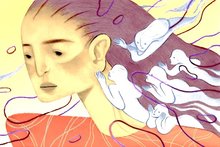
Tired of being numb.
Tired of being depressed while still on medications.
Charlene emailed me telling me she was coming off of her meds.
She started a few basic supplements and cut out dairy, gluten and sugar.
L-tyrosine didn’t work, so she tried l-tryptophan.
Then she cut out all her meds completely and starting taking vitamins, l-tryptophan, 5-htp, and ashwagandha.
12 days off the meds she started to have genuine laughter while watching movies after her mother told her she couldn’t remember the last time Charlene laughed.
I was 9 years-old when I began having suicidal thoughts and began believing negative things about myself. Having been bullied and assaulted at school, molested at home, and shy to the point of being what I believed was invisible to people, I had enough ammunition to build my arsenal of negative beliefs about myself.
33 years later as I look back on my journey with depression, a lot has happened. There wasn’t a single day, even the happy ones, when I didn’t think about ending my life. Not a single day. It had become such a part of me, it was my normal.
I first got counseling and medication when I entered college. I worked to pay for it all out of my own pocket. Family would not help. They didn’t believe in mental illness. To them I just had no faith in God.
You name the symptom, I experienced it. From hearing voices telling me to hurt myself to breaking down in tears in public. I’ve been through it all. I was taken to the emergency room a few times with depressive, suicidal episodes and admitted myself to the psych unit. There were times when I was so depressed I stopped speaking. It didn’t matter to me when people were speaking to me because I just wanted them to hear my pain and do something about it, but no one ever did.

Charlene Got So Bad She Heard Voices
So how did I get to the point where I was willing to give up on medication? I was taking my daughter to see a new prescribing doctor one day. She also has a mental illness and needed to get her medication.
When we entered the office we were told that the doctor would not see my daughter because we were late. I looked at the clock. We were 10 seconds late. I stood there absolutely incredulous. This person with no conscience whatsoever refused to see a child who needed medication to keep her mood stable or she would hurt herself because we were 10 seconds late.
I’d been getting counseling and medication at this location for many years and believed that they would give her the same care. That day I was done. I knew I would never go back, not even to see my own counselor or doctor.
Later that same day, I don’t recall how, I found Dominate Depression and TJ Nelson. I believe it was meant to be because I not only refused to return to the facility, I felt deeply in my heart that life had to be better than what I was living.
The medication made me feel like a zombie. I was still suicidal and sad on my medication and I have tried just about every depression medication in varying combinations for 24 years. Enough was enough. I knew that my medication would run out eventually and it seemed that weaning off them and taking supplements made sense for me.

Many People Report Feeling Like a Zombie on Antidepressants
I tried various supplements mentioned on the site, but some made me feel loopy. Then I tried L-Tryptophan. Bingo! After a few days, I became a new person.
2 months after finding Dominate Depression I sent TJ an email telling him that for the first time in my life I felt human. The constant medicated feeling was gone. The brain fog, the memory loss, the depression, and hallelujah, some of the weight was gone.
I’ve been completely off my medications for over 2 months. I’m so happy for my new start without depression. I have a new life, full of wonderful possibilities that don’t include the fear of breaking down and the lack of emotional control that kept me from doing so many things. I have no doubt that I’m done living under that cloud.
There are times when I almost want to grieve for the 33 years of pain I endured, but that would take me right back into depression. From now there’s only joy. Life isn’t perfect all the time, but I can face the ups and downs as a much stronger woman.
I am so thankful for TJ. His bravery in sharing his experience with depression has made such a difference in my life. I can only do the same for someone else. When you feel this good, you want to pass it on.
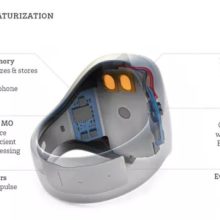
Remember when everyone started wearing things on their wrists to track their steps?
Then seeing them everywhere you went?
Well, it turns out that there are actually smart rings for that as well.
As far as tracking your sleep, most people don’t like the idea of a watch scratching up their face without them being aware of it while they sleep and having to explain themselves at work the next day.
Smart rings can be an effective alternative for tracking your sleep and activity levels.
What you track and measure improves. Tracking something like sleep is vital to heal from depression.
In this video and post I’ll go over my Oura ring review and tell you my honest opinion about it.
I emailed them to be able to give the site visitors a discount (and it supports me as well), so make sure to use the coupon code DOMDEP to get 10% off if you decide to order it.
The reason I chose not to get a Fitbit is because I wanted something that tracked my sleep more accurately and be able to wear something plain throughout the day that didn’t stick out.
Sleep is one of the biggest factors when it comes to fixing depression and that was my main focus. Anything else was more of an added bonus.
When it comes to the Fitbit, it is great with activity and fitness, but looking at it’s sleep function, it was far inferior to the Oura ring.
Fitbits Sleep Tracking
The Fitbit only tracks when you are asleep or when you are awake/restless. That is good for knowing total time spent, but doesn’t tell you nearly as much as the Oura ring does.
***Update***
Fitbit has been updated to show REM, light, and deep sleep
Fitbit has updated their product and they now track REM, light, and deep sleep using your heart rate and movement to best guess what stage you are in. For Fitbit users that works great.
I still prefer the Oura ring since it uses more than just heart rate and movement to calculate what stage you are in and also has all the other features I talk about below such as sleep latency, sleep timing, lowest resting heart rate, time to lowest resting heart rate, body temperature, etc.
This smart ring really shines when it comes to sleep and this is why I use it every single night.
It does this by tracking multiple variables of your sleep.
Total Sleep
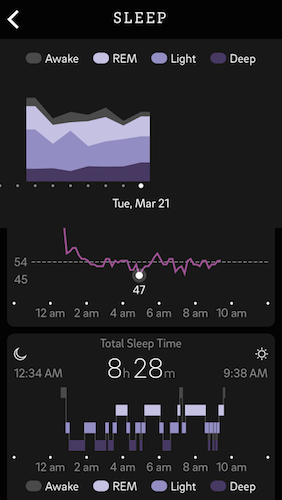
You can see I got a healthy 8h 28m that night
When Your Lowest Heart Rate Occurred In The Night
Deep, Light, and REM Sleep
Sleep Latency and Sleep Timing
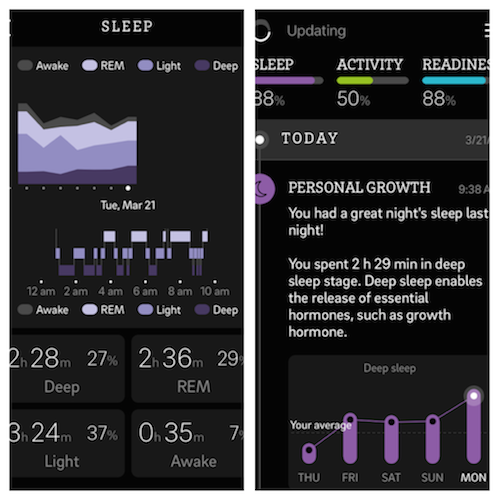
I Got a Healthy Dose of Deep Sleep and REM, Which I Imagined The Ring Saying To Me Nicely When I Got Its Notification In The Morning
Using smart ring technology, it measures different body signals that associate with different sleep stages, restfulness, patterns in blood volume pulse wave, pulse amplitude variation, resting heart rate, heart rate variation, and regularity of breathing.
It does this by having an optical sensor to track your heart rate, respiration and heart rate variability, an accelerometer to track movement and sleep, and your temperature to track sleep and activity levels.
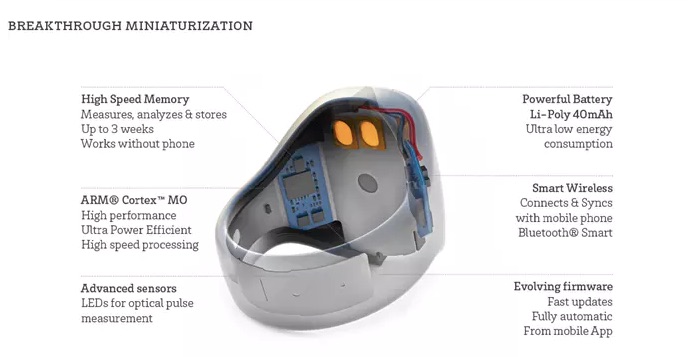
How do we know that the smart ring technology actually works and tracks everything correctly?
In a Finnish study measuring the accuracy of smart rings, they found that in a sample of 14 healthy subjects, the Oura ring provided “unbiased and relevant data on sleep patterns”.
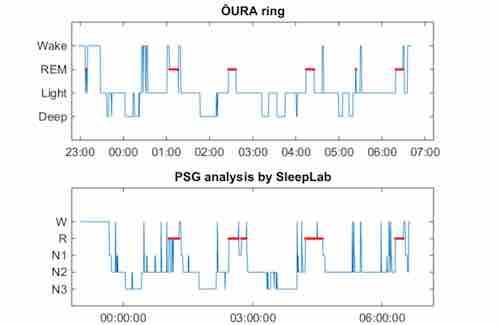
The one thing I don’t think the company communicates very well is how all this technology makes the ring unique. You don’t get that with other tracking devices.
A very popular app that people use to track their sleep is called Sleep Cycle.
There’s a lot of debate whether or not apps like this are really accurate.
Can putting your phone near your bed and having its microphone hear your movements really tell you how good your sleep is?
I put it to the test and Sleep Cycle was good for an overall sense of how my sleep was, but wasn’t the best (it’s alarm is great though). For example, if you are laying there really still (on both the vibrate or microphone mode), it will think that you are asleep, even though you might just have really bad insomnia and are holding still to try and fall asleep.
The Oura ring is able to track that by using more accurate measurement methods than just using either sound or vibration from your movement.
My Sleep Cycle data is sometimes very different than my Oura ring. The Oura ring also shows you actual time and percentages you spent in REM, light, and deep sleep as well as how long you were awake.
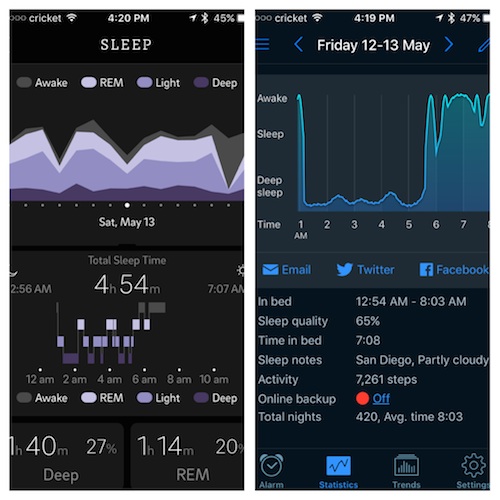
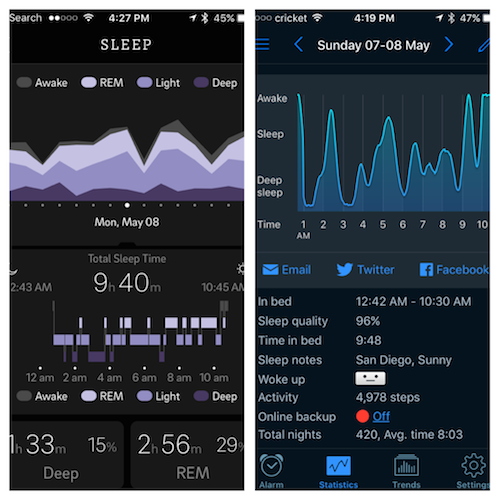
You can see that the data seems to align on the second picture, but in the first picture you will notice that Sleep Cycle thought I was in a coma from 1:00am – 5:30am when the smart ring was showing that I actually went through a couple cycles of sleep before waking up to face the day on less than 5 hours of sleep (it was a bad day).
Sleep Cycle is really cheap at just $1.00 and I still use it for my alarm clock since it is really gentle and I like how it gives you a wake up “window.” When the smart ring can do the same thing and wake you up with vibration, however, it will be game over for other apps.
Your readiness score will help you figure out which days may be more challenging for you to get through and which days you are ready for a big challenge. Anything above 85% means you are doing good.
This is measured by looking at your previous night’s sleep, your total sleep score over the last two weeks, how much activity you got the previous day, how much activity you’ve gotten over the last several days, your resting heart rate, how long it took your body to reach its lowest resting heart rate at night, and your body temperature.
A few times, it actually alerted me that my body temperature was elevated at night and that could mean I was coming down with a sickness. Sure enough, I had early signs of getting an infection and I was able to hurry and rest, take the proper steps, and stop it before it took over.
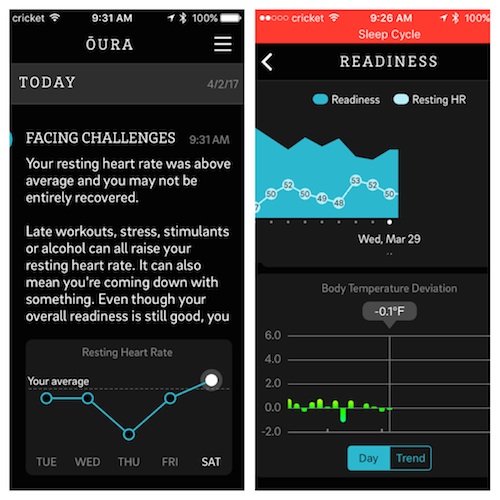
Readiness Examples. Right: Shows My Lowest Resting Heart Rate and Temperature Deviations. Left: Shows The Loving Caring Messages You Receive In The Morning When You Aren’t Recovered
It’s weird, I had almost forgotten what I was getting out of the ring but the more I write about this smart ring the more I’m realizing how cool some of the features actually are. When I first got the ring I was obsessed with the data. After a while, I forgot to look at it more closely.
The “activity” section is my least favorite part of the ring, although it is still really useful.
The “activity” sections shows you how active you’ve been and if you have hit daily targets.
The Oura ring helps you hit your targets based on how old you are, your gender, and your “readiness” score.
When your “readiness” score drops too low, the Oura ring will lower your daily targets to compensate.
It does this by tracking your steps, measures your “activity burn,” and gives you an estimate for how many total calories you burnt.
I didn’t quite believe the ring could track my activity level properly. Surprisingly, the “calories burnt” section was accurate.
I tested it’s ability to calculate the calories I used in the day by using the ring and then getting a metabolic test at a facility. The ring was within with the range of calories the facility reported.
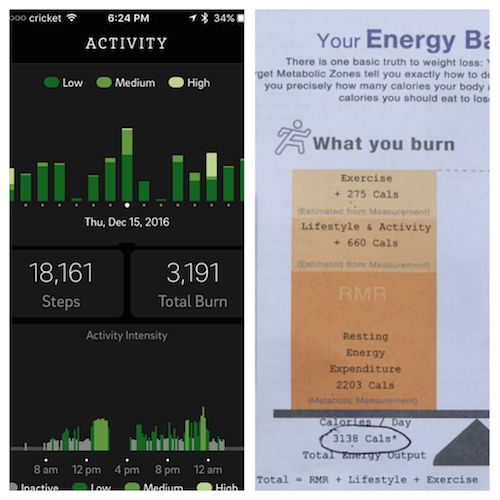
Oura Ring Showing Calories Burned On The Left and an Actual Metabolic Analysis Test On The Right
The ring also gives you a reminder on your phone when you’ve been sitting or sedentary for too long. This can be a great feature for people that work on the computer or sit a lot.
One disappointment I had with the ring is that it doesn’t measure your heart rate throughout the day, only at night.
There isn’t a real-time section so you can go running and get yourself in your optimal range.
It would be nice to have an option to turn heart rate monitoring on during the day so that you can test your heart rate during exercise or to use the heart rate method to diagnose food sensitivities.
This smart ring is constantly updating and improving. I will frequently get a firmware update notification, update the ring, and then get new features and better measurements.
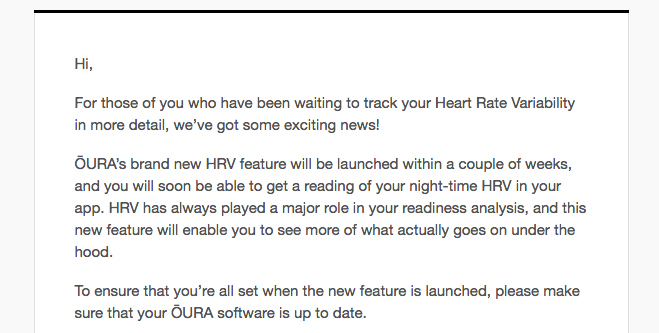
It’s Like a Tesla Car But On Your Ring – Constantly Improving Itself
It really shines with it’s sleep tracking. After over a year of using the ring, I can say it is very accurate. When I am awake, it logs that I am awake. That doesn’t happen with iPhone or Android apps that I’ve used. After a really good night’s sleep, I’ll check my phone and it more often than not tells me I slept great. After a bad night’s sleep, I’ll unlock my iPhone and get a notification that I didn’t get very much REM.
The sleep tracking part alone is why I am confident in recommending it, since when you have depression, if you aren’t sleeping properly, you don’t have much hope in feeling better.
You can weight lift, train, and run with the ring very easily. It’s comfortable enough and doesn’t bother you. You can bring it in the sauna, since it was specifically built to withstand hot and cold temperatures. You can wear it while swimming, because it can withstand being submerged up to 50 meters underwater.
They partnered up with the Curious platform so you can run various tests on yourself and track the effects. This means you could try l-tryptophan for a few nights to see how it affects your deep and REM sleep instead of trying to guess solely based on how you feel.
The ring charges fast.
It’s big.
The pictures on the site don’t quite show how big it is. This size can either be a good thing or a bad thing, depending on your style.
When I lived in Dallas, Texas, it brought a lot of awkward attention. When I was an outside sales consultant, I had to take it off before going into people’s homes because they always thought it was weird. It looked like I was trying to wear a big expensive ring to show off that I was rich.
However, living in San Diego, nobody really noticed at all. In fact, if people asked about it and I started telling them about it, it would lead to a great conversation.
A few times I accidentally wore it during one of my videos I recorded for this website and people would comment on it as if I was rocking out with a big nice ring for no reason.
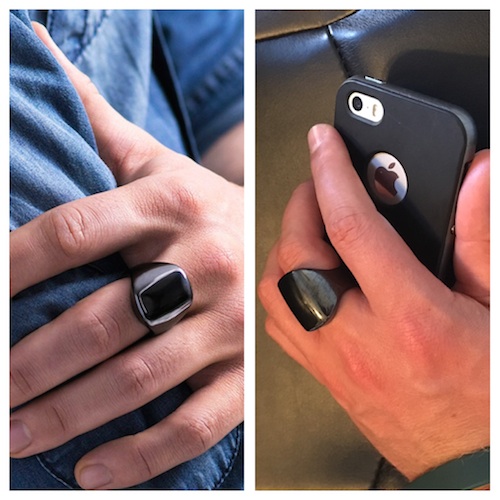
Left side: Oura Website. Right Side: My Hand
You can see in the picture that the ring looks considerably smaller on the left side, which is a picture from their official site. The right side is my hand. You can see that the ring takes up almost the entire section from where my finger begins from my hand to the first knuckle.
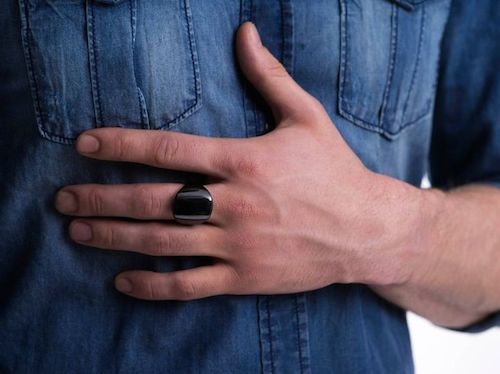
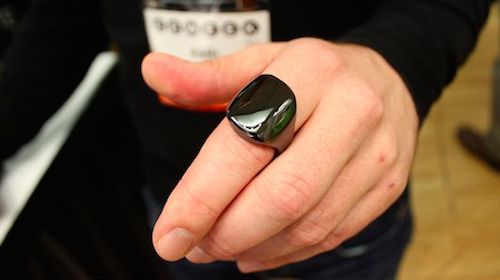
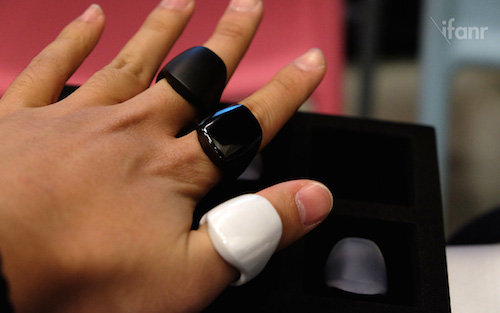
As you can see from the pictures off the internet, the first one is from Oura ring’s site, the second is a random picture of someone wearing it on the index finger, and the last picture shows a woman wearing all three models at once.
If you just look at the website, you might think that the ring is small, but in reality it is pretty big. Depending on who you are, it could either enhance your look or detract from it.
Another disadvantage is that it only records your heart rate at night. It would have been a great feature to be able to turn on heart rate monitoring during the day to test different things like food allergies or for exercise.
Battery life is a disadvantage. At first, one charge would last 3 days. Now that I’ve had it over a year, the charge drops to 50% or less just from one night. It would be nice to take it on a 3 day camping trip and not worry. After owning the ring for over a year, you won’t be able to do that as the battery life gets worse.
It is a bit pricy. It comes in at $299. That’s a bit high for some people, but for the person that is serious about tracking their health and making sure what they are doing is working, that isn’t much at all.
On the one end, I use it every single night. On the other end, I stopped wearing it during the daytime after the first year.
If you are looking for something to track your sleep, let you know about how you are recovering and give you insights on what’s working for you or not, the ring is for you. We all know that when brain fog comes in it can be hard to figure out what is working and what isn’t. The Oura ring allows you to do that.
It is a bit on the pricier side and the battery life isn’t the best, but that wasn’t too big of a deal for me since I charge it every night and I am willing to invest in my health and getting better.
That being said, I feel that when the smart ring integrates a vibrate function to wake you up when you are in a light sleep state, has better tracking for the daytime and allows heart rate monitoring during the day and becomes smaller, it will be an absolute no-brainer to purchase.
I emailed them to get my website visitors a special deal, so you can order through this link or use this coupon code to get a discount. Make sure to use the coupon code DOMDEP to get 10% off. You can visit their site here.
When you place an order, they first send you a kit with sample rings so you can wear it for a day or two to make sure it is the right fit and then you send in your size and they send you your ring.
Let me know if you’ve used the ring or if you have any questions below.
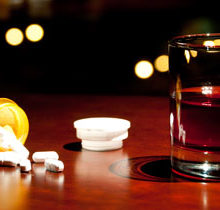
Helen emailed me letting me know that she was was off citalopram and had emotional stability.
Since having a baby 12 years ago, she struggled with depression, SSRI dependency, and had a midlife crisis.
Now she is able to cope without using sugar or alcohol.
Naturally, I wanted to share her story.
I was a classic Alpha-type personality – from business school to a career in Finance (to please my Dad!), teaching aerobics, captaining a sports team in my ‘spare’ time, and maintaining a long distance relationship. I worked just as hard at my social life and would not be happy unless I had plans fixed up for weeks in advance.
After 10 years of this, I suffered bereavements of 2 friends in close succession, and I hit a depression which I labeled my early mid-life crisis.
The work, hobbies and socializing was not giving me a rush any more. I couldn’t get out of bed and needed a solution. So after reading lots of motivational books, my solution was to plan harder, work harder and leave even less time to think!
Most people around me were gently hinting that I may need some help from therapy and/or anti-depressants but this was the UK, 20 years ago and nobody talked about their feelings!! So I carried on and spent more time drinking alcohol to drown out the feelings of negativity. Friends around me were getting married and having children and I had decided that was not going to be me as I was a career woman and didn’t need that baggage.
I started to take SSRIs after another ‘mid life crisis”, and refused therapy as the solution was surely just to work harder and then I would be happy when I had achieved all of my goals! One concession I did make to my inner voice was to reconsider my career – I had really wanted to be in healthcare but thought that would disappoint my parents who expected me to be in business.
I had a new project – retraining for a new healthcare career and that managed to become my focus for the next 5 years. I stopped focusing on my depression. I was just way too busy to examine my innermost feelings and that was fine with me. Still on SSRIs, but again using alcohol and socializing to bridge the gap I was feeling. I was lucky enough to meet a new boyfriend who became my husband during that time and that also kept me busy.
After I graduated with a medical degree, I could not wait to get started in my new career – I had so many plans!! But within a few months my husband got posted abroad for his job and I had to follow him. So, suddenly in a new country, we had to get married for a visa, and I became pregnant very quickly.
I could not work for legal reasons and with no friends, family, or work, I had to bring up a new baby by myself. My baby represented everything I could not control and I quickly fell into severe post-natal depression, although it was undiagnosed because I hid it from my OB-GYN.
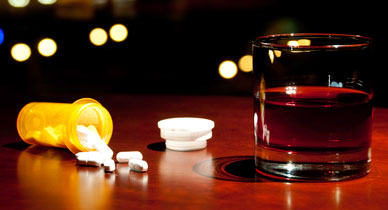
Antidepressants and Alcohol Can Be A Tricky Combination
There were many days with thoughts of self harm and harming the baby and I was in despair. I had stopped taking SSRIs as I worried about their effect on my pregnancy. Plus now that I was a healthcare practitioner I could not admit to having depression myself!
I struggled on for a few years with my baby who, despite everything, was lovely. However my partner and I were not in a good place and divorce was a very real prospect. We were saved by having an opportunity to move back to the UK and with more friends and family around the daily trials of looking after a small child were eased and I could start working again.
I was so excited to find a part-time healthcare consultant job near to my home and arranged daycare for my child and quickly got stuck into my new role. However things were not as they seemed – my boss was unstable and demanding and I found that I was working full time hours on part time pay, plus having to do all of the child care when at home as my husband was on late shifts. The expectations I placed on myself finally tipped me over the edge.
I was hiding in my bedroom from everyone when I was not at work, and crying all of the time with no provocation. I stopped all socializing and was desperately fantasizing about leaving my family to move to a deserted island in the middle of the ocean with no other humans around.
A friend actually convinced me to book a doctors appointment and after a questionnaire, I was again diagnosed with depression and given SSRIs again – therapy was an 8 week wait. So I read self help books instead. This helped in the short term and after a year I wanted to come off the SSRIs and get back to ‘normal’, except it wasn’t that easy. When I was younger there were no withdrawal symptoms but it was 10 years later and my brain could not bounce back.
Horrid hot flashes, leg cramps, insomnia, the famous brain zaps, crying jags, fainting and dizziness were happening constantly and I could not cope. So I went back on the SSRIs, and then off them again – with the same results, and so I tried a total of 4 withdrawals over the past 10 years all with the awful withdrawal symptoms. My doctor suggested various patterns of decreasing the dosage but it did not help.
I was resigned to having to be on SSRIs for the rest of my life because of these awful withdrawal symptoms – until I found Dominate Depression. Suddenly there was a new way of looking at how depression occurs and an alternative way to treat it. I was so impressed with the explanations about bio-chemistry in lay terms, and the fact that the suggestions were tried and tested by an actual person on themselves. I felt confident that as someone was willing to do this and put their name on it that it must be effective.
I started the amino acid therapy and reduced my SSRIs – which did have a noticeable impact within a few days. Side effects were reduced by about 90%, and I could follow the whole tapering program with the SSRIs without fear!
Since then – 3 months ago – I have happily ordered a lightbox, and continue to use the amino acid regime, and other supplements such as magnesium. I have started seeing a Cognitive Hypnotherapist who helps reset the negative thoughts.
Like other people who have discussed their stories, I know that the Dominate Depression approach is not a silver bullet – you have to work to get the best results – but it is the best approach to depression that I have used in my 25 year history and it is the only approach that I recommend to my patients and friends.
Since being on the program I have started my own business and I know that I could not have done this without the support of the website. I am very grateful to TJ and happy to recommend Dominate Depression to any fellow sufferers.
Thank you – Helen
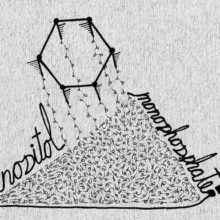
Inositol powder is one of those supplements you never really hear about.
It is technically not a vitamin but is considered a member of the B vitamin family.
It can be great for anxiety, OCD and insomnia.
Inositol is involved with serotonin pathways which is why some people with depression can benefit from it.
There are many different versions of inositol to choose from and most of them are relatively cheap.
I’ll go over the different variations, what you can expect, and how to take it.
Inositol is sometimes referred to as vitamin B8. In reality, it is a carbohydrate that the body produces from glucose.
Inositol’s main job is to break down fats, help with cholesterol, and assist the liver in it’s job to prevent fatty acids from building up and causing havoc. It is present in your entire body. Neurotransmitters in your brain need inositol to be able to fire properly. If you aren’t producing enough inositol on your own, you’re going to feel an impact on your mood and cognition.
Most people consume around 500 to 1,000 mg of inositol per day on their own. You won’t ever see it on a nutritional label, but it is found in foods such as rice, nuts, legumes, meat, and citrus fruits.
Choline-Inositol
Both choline and inositol are regarded as members of the B vitamin family. Many people believe that taking choline and inositol together provides a synergistic effect. Most people who take choline-inositol are interested in nootropics, which are chemicals intended to enhance your mental abilities. People use nootropics for focus, motivation, learning, memory, etc. Nootropics are often called “smart drugs.”
Choline is necessary for your brain and body to function properly. If you run out of choline, your liver isn’t going to work. It is the precursor to acetylcholine, which affects your ability to learn and remember things.
As you can see, inositol and choline both play a similar role in the liver and your cells. Taking both together can help with fatty acids and with the production of choline so that it can be used to create acetylcholine, increasing your cognitive ability.
For depression and anxiety, regular inositol should do the trick, and the only people I have encountered (so far) using the choline-inositol combination are people interested in smart drugs and enhancing their cognitive focus. You can get choline-inositol in a supplement.
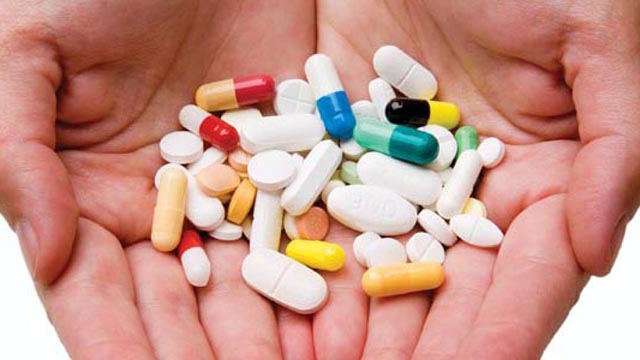
There’s a Nootropic For Everything Now
D-Chiro-Inositol
Sometimes shortened to DCI, d-chiro-inositol is referred to as “inositol” but it is questionable as to how closely related they are (kind of like inositol and b vitamins, inositol is a grey area type of guy).
It is known to be important with insulin signal transduction.
D-Chiro-Inositol is primarily used to help with diabetes and polycystic ovarian syndrome (PCOS), and isn’t closely related to anxiety or depression. It comes in a supplement form as well.
Inositol Hexanicotinate
Inositol hexanicotinate (also known as inositol hexaniacinate or inositol nicotinate) is inositol and niacin combined together to eliminate the “flush” that comes when people take niacin. It’s purpose is for people to enjoy the benefits of niacin without having to worry about the side effect of becoming redder than an apple and itching all over.
Inositol Hexaphosphate
Inositol hexaphosphate is also known as IP6, myo-inositol hexaphosphate, or phytic acid. As you can see, it appears that the people that named the various forms of inositol are still a bit confused as to all the forms and what inositol actually is.
Anyways, inositol hexaphosphate has been shown to be effective in cancer prevention. When combined with inositol, it has a synergistic effect against a variety of cancer types.
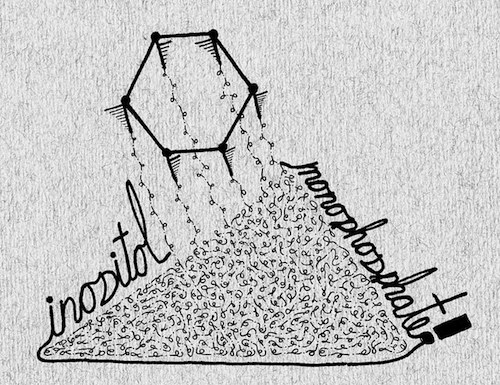
Alright, now that you know the different versions of chemical compounds with the word “inositol” in them, we can talk about plain old boring inositol with nothing else added and attached to it.
Other than the generic benefit of providing an essential nutrient that your whole body and your liver needs, inositol has a big role with mood.
This is because inositol plays a role in the levels of serotonin in your brain. I know everyone reading this knows the effects of serotonin on your brain, whether it’s from taking an antidepressant or doing a quick search on Google.
Taking inositol can have a calming effect due to these effects on serotonin. It has been used and clinically researched for the treatment of panic attacks, ADHD, and depression.
Inositol for Anxiety and Depression
When most people think about fixing anxiety and depression by fixing serotonin levels, they first think of using an SSRI or antidepressant like Celexa or Zoloft. When those things fail, they learn that l-tryptophan and 5-htp can be a natural way to give your brain the natural building blocks that it needs to create more serotonin on its own.
Inositol is one of those things that doesn’t get too much attention but can be just as effective. It is generally safe to take with medications, unlike amino acids which need some more planning before using with antidepressants.
Inositol would be a good idea if you tend to experience things like anxiety and OCD with your depression symptoms.
For people that want to use inositol for general health benefits, 500mg taken twice a day is enough.
The best dosage for most people with insomnia is to take 2 grams of inositol powder in water before bed.
People suffering from OCD or bad anxiety will need to take much more. In some studies, people with OCD had significant improvement from taking 18 grams of an inositol supplement throughout the day and 12 grams of inositol powder was shown to be effective in treating panic disorder.
I had taken inositol in the past to help with anxiety but nothing with any regularity. I don’t really tend towards OCD and the other supplements had a bigger impact for me.
However, one thing that I have struggled with is not being able to sleep because my body is in the “fight-or-flight” mode. I can generally handle the anxiety I experience in the day but when it affects my sleep, that’s when things get bad.
I went and got some inositol powder here and did an experiment by taking a good spoonful before bed. I ate a spoonful of cashew butter and drank my inositol before going to sleep.
The thing with me is I will never just fall asleep randomly. You know the people that can be sitting there mid-conversation and accidentally fall asleep? Or they can turn on the TV and know that eventually their body will produce a tranquilizing amount of melatonin to knock them out and the next thing they know they are waking up in the morning?
That isn’t me. I have to consciously close my eyes, lay back, have no distractions, and decide I am ready to go to sleep and coax myself into it.
This changed when I took the inositol powder.
Usually I’ll watch a few videos on my phone with night shift enabled while I’m laying in bed before I decide its getting too late to carry on my bad habit of using electronics at night. I won’t fall asleep until I set the phone down and decide it’s time.
When I took inositol, guess what happened? All a sudden 6-7 hours later, I’m waking up with my phone still in my hand, meaning that I had fallen asleep without knowing it.
As you can see in the graph (I track my sleep every night, I’ll have a post for that soon), you can see that I slept more deeply than normal.
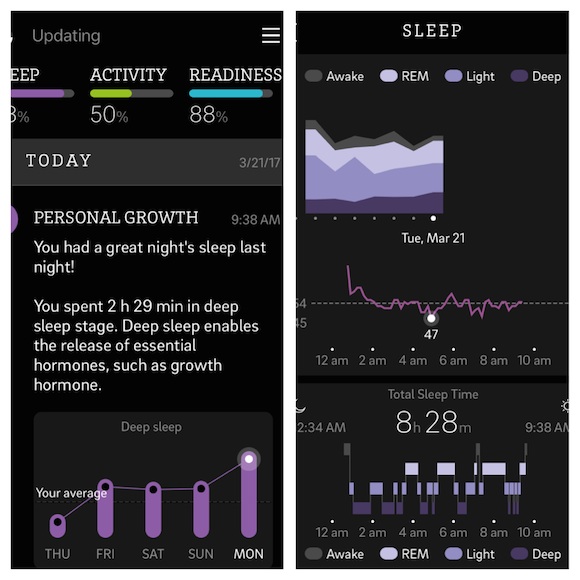
Deep sleep is really important for physical recovery and, which with my current health issues, is really important for me. I also sometimes only sleep for 7 hours, so getting over 8 hours of sleep was great.
I also noticed that I felt almost this interesting sense of calmness the next day. I took inositol powder for three days and noticed a calmness that I don’t necessarily experience each time.
Inositol powder is one of those compounds that not too many people hear about. It doesn’t get too much attention.
It comes in a bunch of different forms, but just the regular stuff will do the trick for anxiety and depression.
It is an inexpensive and relatively risk free way to possibly help your depression, sleep, anxiety, and OCD.
You can get inositol powder here. That’s an affiliate link, so if you buy it using my link, I make about $0.03 and it helps support the site.
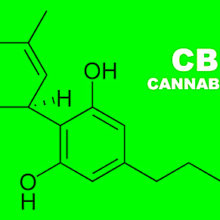
When CBD oil first came out, some people wrote it off as another product intended to get you high without any real benefits.
A lot of people think that marijuana is all about getting stoned.
Then, on U.S. national television, it stopped an epileptic seizure.
Now we have people saying that CBD is a miracle chemical and can help anxiety, depression, and pain.
Does it work?
Can you use CBD oil for anxiety and depression?
Well, yes, depending on if you get a high quality product.
Cannabidiol, or CBD, is one of the active cannabinoids in cannabis. It can actually account for up to 40% of the active cannabinoid content.
CBD hemp oil is made from hemp that has high amounts of CBD and low amounts of THC. THC is the cannabinoid that most people are familiar with. It is responsible for the “high” that you get if you take or smoke marijuana.
This means that CBD oil is non-psychoactive. This has allowed CBD oil to be used for a lot of medical purposes because you don’t have to worry about it affecting your mental state.
I don’t know about you, but even if something was really helpful, I wouldn’t be able to function at all if I was stoned all day and night.
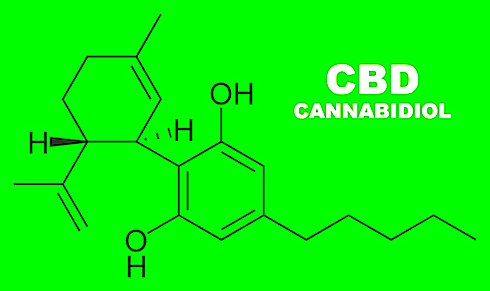
CBD oil effects your body by binding to cannabinoid receptors. You have cannabinoid receptors all over your body, including your skin and digestive tract.
CBD oil can also act as a 5-HT1 receptor agonist, meaning it can help with depression and anxiety by playing in a role in the serotonin pathways.
Because CBD oil affects so many aspects of your body, including the endocannabinoid system, it can help with inflammation, mood, memory, immune system, reproduction, pain perception, sleep, and appetite.
The biggest benefits, and why it has gotten so much of the spotlight lately, is that CBD oil has helped people with rare conditions such as Dravet syndrome, a rare form of epilepsy that is hard to treat. People have gone from having multiple seizures per day to being seizure free for an entire week using CBD oil.
One strain of cannabis is called Charlotte’s Web, which has almost no THC in it, and has been used for medical purposes ever since it helped a girl named Charlotte stop having really bad seizures after trying all the other approaches.
CBD oil has clearly proven itself as a therapeutic substance to help a variety of ailments, and it can also play a role in helping anxiety and depression.
There are two primary ways to supplement with CBD oil to help with anxiety and depression. First, you can take pure CBD oil that has no THC. Secondly, you can take CBD oil with THC to get the benefits of both.
Cannabis oil, for example, has high amounts of THC whereas CBD hemp oil is legal and non-psychoactive.
Many people with anxiety and depression can’t use marijuana because of THC’s effects on their mental state. However, it has been found that THC can potentiate the beneficial effects of CBD.
I could never smoke marijuana or consume high amounts of THC because it makes me more anxious and paranoid. In fact, the only panic attack I ever had in my life was when I was younger and under a lot of stress and decided to smoke a joint when it was handed to me.
When I heard about CBD oil and how it doesn’t get you high like THC does, I gave it a try.
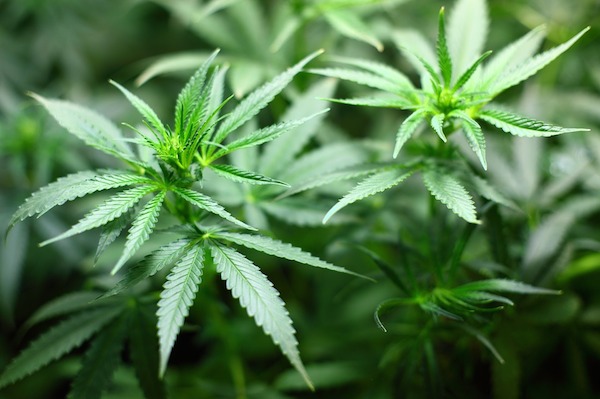
Benefits of CBD Oil for Anxiety and Depression
In a 2011 study, they took in 10 people with social anxiety who had never received any treatments for their disorder. They were given either a placebo or 400mg of CBD. The participants who were given CBD oil had successfully improved their anxiety symptoms compared to the placebo.
Why did this happen?
Some research suggests that since THC and CBD affect certain receptors in the amygdala, a part of the brain that engages our fight-or-flight response, taking CBD can make that region of your brain less excitable. This means that the CBD oil can dampen your response to stress and anxiety.
A lot of people with PTSD are also finding tremendous relief by using CBD to help ease their symptoms. It has allowed them to go about their day and get stuff done without any side effects of laziness that can sometimes happen with THC.
CBD oil can inhibit hepatic drug metabolism and activity of some liver enzymes, such as cytochrome P450.
One side effect from taking CBD oil can be having a “dry mouth”, which if you have ever smoked marijuana, you know what this feels like.
At the current moment, it is unclear as to whether or not it positively or negatively affects people with Parkinson’s disease.
However, most studies conducted on CBD oil have shown little to no side effects. This specific review shows that controlled use is safe and non-toxic for humans.
I didn’t experience any side effects when I experimented with CBD oil that had no THC in it.
Here is where CBD oil can get tricky. When I began my journey into supplementing with CBD to see its potential, I ran into a lot of companies where I had no idea what I was getting.
The quality matters, as it would be easy to market something as CBD oil when it has very little CBD in it at all.
Some of the products I tried I felt nothing at all even at high doses, others had weird ingredients, and it wasn’t until I started experimenting with prescription CBD and high quality brands that I started to see benefits from it.
I noticed a slight decrease in anxiety and it helped to ease some of my digestive symptoms. When I took a large amount of the tincture as an experiment it had a significant calming effect.
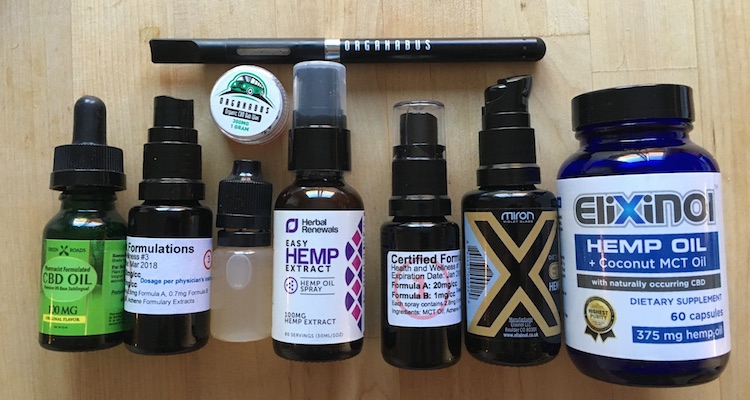
Some Of The Products That I Tried
CBD Tincture, CBD Capsules, & CBD Vape
I tried a tincture, capsules, spray, and a vape. Each of which were different brands.
Depending on how often you want to take it, capsules were by far the easiest method and also the most expensive. With capsules you know exactly how much you are getting each time and it is easy to carry with you if you want to keep dosing throughout the day every few hours or so.
The tincture you would have to carry around and depending on the quality of the cap, it could leak out into your pocket. The tincture would be harder to dose with throughout the day and the dosing wouldn’t be as accurate.
The spray was very easy to use and would be a bit easier to carry around than a tincture, but could still pose problems if you kept it in your pocket because you could accidentally spray some inside your pants.
The vape would be very easy to carry around, but I don’t really enjoy having to inhale something, as it reminds me of when I had a problem with drugs back in the day. You’d also have to use it more often. This could be a great method for you, however, the brand I used was probably low quality and I have no idea if using a better brand would change my opinion on using a vape.
CBD versus CBD Combined with THC
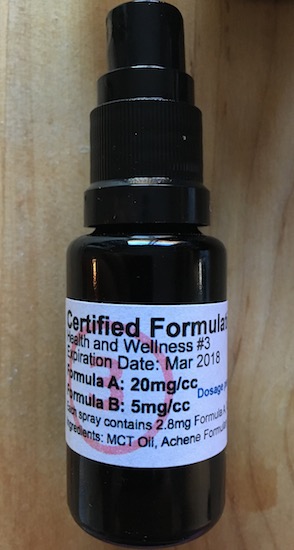
1:4 THC to CBD Ratio Spray
THC and CBD have a synergistic effect, meaning that they both enhance each other’s beneficial properties. Many people believe that it is optimal to take both at the same time.
I am in a state where medical marijuana is legal. I called up a doctor and received my prescription really easily. I used the network that they recommended and got both a spray with very low THC in it and a spray with a slightly higher concentration of THC.
I was told to take two sprays of the low THC concentration every 4 hours throughout the day and then two sprays of the higher THC concentration after dinner and at night as needed to help with sleep.
I noticed after a few days that the higher concentration of THC was actually making my sleep worse and I started to have weird nightmares. I started to lose some motivation and overall didn’t like the feeling at all, so I stopped taking it.
Again, with all things, each person will react differently so you will have to know yourself well and maybe experiment with a few different concentrations to know what is right for you. My friend used an equal ratio of CBD to THC and after just a week, his blood pressure was down, his bowel movements were much more regular, and it helped with his lactose intolerance.
Of all the different brands and products that I tried, the best (and most expensive) was the one that came from the Statewide Collective in California. With them you an get the exact ratio you want, they only have good ingredients, and it delivers right to your door. The best option will most likely be to get CBD oil that comes from medically grown cannabis plants and a controlled process.
The second best option was Elixinol. They also only use good ingredients, have actually had their products tested so you know what you are getting, and I felt beneficial effects from it. Their farmers are 4th generation hemp farmers in Europe.
The rest I got varying results from. The random tinctures I bought at local head shops had unknown effects. It would be hard to know what you are getting if you just drive down and buy the first brand you see.
I wouldn’t particularly recommend ordering from Organabus, as I didn’t feel anything from their vape product and didn’t have any results with anything else on their site. Their site was also a bit confusing and I was unsure of what I was ordering. However, their customer support was great over email.
The others had some interesting ingredients and although not particularly harmful, I like to take only the purest and highest quality ingredients. If you are already purchasing something for its beneficial effects, why waste your money by trying to buy a cheaper product when it doesn’t work for the thing you are trying to do in the first place?
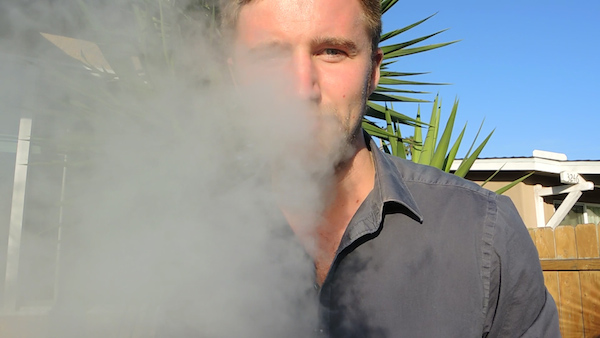
Using The Vape Pen
Where to Buy CBD Oil and How To Get a Prescription
If you are looking to take CBD oil with THC to combine both of their beneficial effects or you want the highest quality you can get, if you live in an area where it is legal you can either just buy it from local vendors or get a prescription very easily.
I made a costly mistake of going to a “doctor” that my friend swore by who would prescribe me the “right concoctions” for what I needed. In the end, I wasted $300 for someone to not even listen to my health problems and just assure me that I needed marijuana and gave me a prescription.
If you live in an area where you can get a prescription, it is much faster and more cost effective to get on Skype with a doctor for 10 minutes and get your prescription within the hour. One such place is Hello MD but I’ve heard of others that are extremely easy. My friend got on Skype and got his prescription in 45 minutes and I think only paid $40.
In the state of California, once you have your prescription you can order the best products from the places that you need a prescription. One that I used is www.statewidecollective.org.
If you don’t live in a place where you can get a prescription (or even if you can get a prescription), Elixinol was the best brand that I found that anyone can order from and be able to benefit from CBD oil. They offer capsules, sprays, etc.
You can enter the coupon code 10off422 on Elixinol’s checkout page to get 10% off or you can order at already discounted prices here.
CBD oil is virtually a risk free way to potentially help you with health problems like digestive issues and things such as anxiety and depression. If you suffer from insomnia, anxiety, or stress I would order some CBD oil and see if it works for you.
The main thing you want to look out for is making sure you are using a high quality brand as there is a lot of spam out there in the CBD oil marketplace.
The best CBD oil in my experience is ordering from pharmacies where you need a prescription or through a high quality brand like Elixinol.
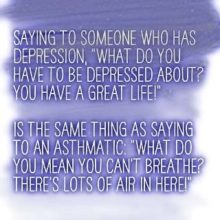
How do you know if you feel bad because you have situational depression or if there’s something wrong with your brain and body?
Do you feel bad because you are going through a bunch of life transitions, you just lost your job, and are fighting with your spouse? Or is it because you aren’t eating right and your sleep is messed up?
The answer is, it depends.
It’s not always so black and white.
This video and post will go over the difference between situational and biological/physical depression and how they interact with each other.
However, some people have everything working properly in their bodies but events in their life are causing havoc on their emotional state.
For example, one of my best friends just died and it was probably suicide, I just learned that I am now struggling with bartonella or possibly lyme disease, I’m in a new town with hardly any friends, and under a lot of stress.
I felt really down, overwhelmed, sad, low energy, for a good 2-3 weeks. I felt out of control with everything going on and dealing with all the stressors. As I worked through the situation, despite nothing changing physically, the cloud starts to lift and the darkness goes away.
This could be you if you are moving to a new town, going to a new college, and having fights with your parents. This could be if you are having a major breakup. This could be if you just lost your job and you aren’t sure what you are going to do next.
Situational depression is when your external circumstances affect how you feel. It resolves itself through working through the problem, getting help, acceptance, feeling emotions, changing your cognitive thoughts, etc.

You Can Be a Hollywood Celebrity & Still Feel Depressed
Situational depression is vastly different from biological depression. With biological depression, you would be trapped in a state of depression regardless if whether or not you were living in a mansion with no worries or if you had every worry in the world.
For example, if you had a severe magnesium deficiency, you could be depressed with anxiety for years until you resolve the magnesium deficiency. It doesn’t matter how great your life is, your body needs more magnesium to be in balance and function properly.
Having depression that is biological means that your brain isn’t going to work right no matter what you do in the external world. It doesn’t matter if you are jumping out of a plane if you’re deficient in amino acids and b vitamins, your brain won’t even be able to produce the neurotransmitters to feel any pleasure at all.
I had depression really bad for about 11 years. At first, I thought it was all my fault and that my life just sucked. I tried riding a fast motorcycle, skydiving, running a marathon, etc. and I never felt happy at all. I did all the therapy in the world and still didn’t feel any different.
That’s because physically my body wasn’t working right. It would be like having a really good map, great friends as passengers in the car, and trying to get to a different state when your car’s engine has a leak. It doesn’t matter how many friends you have with you, or how much money you have, you aren’t getting to your destination as long as the car (your body) isn’t running properly.
This is also why antidepressants tend to work really well for a short-time, because they are changing what is happening inside your body, and therefore you see the world completely differently.
Unfortunately, they often come with a lot of side effects and in the long-run don’t solve the root problem. Then you are left still feeling horrible and now you have to deal with weaning off the antidepressant.
Solving the actual root causes of your depression can come in many different forms, from vitamin/mineral deficiencies, being allergic to certain foods, hormonal issues, etc.
When you have situational depression, you can fix the depression by changing your mindset or your lifestyle. If you have depression that is caused by physical root causes, it can only be fixed when you fix the root causes.
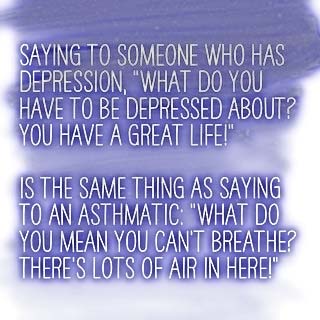
Sometimes I have people ask me if they should be doing therapy also. The answer is always yes, if it helps you. Getting as much help and support as you can is always a good idea.
Depression isn’t always just 100% situational or 100% biological.
Being physically depressed to where you have no energy can make it so you miss days at work. This causes you to lose your job. You then dig yourself into a hole and lose touch with friends, and now you are in both a physically and situationally bad place.
If someone you love dies and you lose your home, the stress can wear you out. Being worn down can cause you to become depleted of b vitamins, and now the situation just caused your body to break down and physically it isn’t running properly.
Both your situation and your physical state play into each other. You can have situational depression and biological depression. They interact. You always want to be able to attack depression from all angles.
The only thing I have noticed, however, is that society as a whole has done a really good job at providing resources for helping people with situational problems, and very little on fixing the root causes physically.
If someone has physical root causes, it doesn’t matter how much therapy you do. No matter how many hours you spend with a therapist, that won’t change a vitamin d deficiency. You just need to take vitamin d.
You want to attack depression from all angles. Get as much of the right type of support as you need and make sure you are fixing the physical root causes simultaneously.
Make sure that when you start to feel good, don’t let all your good habits drop. Keep doing what you need to do such as supplementing with the right supplements, getting tests done at the doctor, eating healthy, etc.
We are sold on the idea of quick fixes and band-aid solutions. One quick cognitive trick to feel better in 30 seconds! One little blue pill that will solve all your problems!
The truth is, that can work for a short while, but it’s never long-lasting. I get probably 3-5 emails every single day from someone that has been on antidepressants for a few years and now they feel worse then before and are dependent on a medication. Then we have to wean off of it which is hard and painful.
Instead of quick fix, think of fixing the root causes and building a base of solid nutrition so your body can function right.
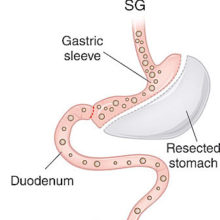
One thing you’re never really told about is how severe the side effects can be when taking antidepressants.
Antidepressant medications aren’t these risk-free pills that anyone can take without worry.
Sheree had been battling with depression and hopelessness. After taking antidepressants, she now had to worry about weight gain after it caused her to put on 30 kilos (66 pounds).
Here is her success story of being on antidepressants for 8 years, gaining weight, and beating both those problems.
Ok, where to start. Well my names Sheree and 8 years ago I was diagnosed with post natal depression after the birth of my third child. If I take myself back to those days it was a dark time for me and my family. I remember the frustration of not understanding why I felt so sad and tired.
The confusion of feeling guilty and feeling like I was a failure because I shouldn’t have been sad. I had no right so to speak to be sad. I had a wonderful life, a wonderful husband and 3 amazing children. We had food on the table and wanted for nothing. But the fact was I was dying on the inside.
After many years of the depression roller coaster and many different medications I was still no closer to being happy and fulfilled with life and starting to give up any hope of beating this thing called depression. I worried that this internal battle was going to be for life. That thought alone was depressing because I was constantly tired and grumpy and bad tempered with my girls. I just wanted to isolate myself from the world.
I also put on 30 kilos over the 8 years while on the antidepressants which caused me to then loose self confidence. Now I had two wars going on inside of me. Depression and weight gain. So I tried to loose weight again and again with no real permanent change.
In April 2012 I had a gastric sleeve operation in a desperate bid to loose weight. After the surgery I lost 30 kgs and felt amazing for 2 years. I even completed my nursing diploma. But in those 2 years I had malnutrition because I wasn’t eating enough good food and protein and I’d also lost a lot of hair and started getting inflammation problems in my joints.
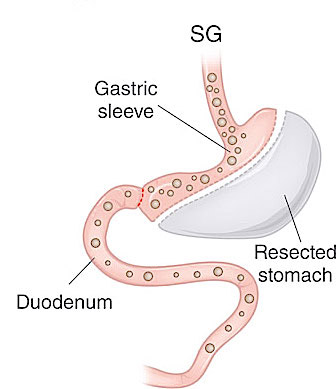
Gastric Sleeve Operation Caused Malnutrition
After 2 years my body crashed which made me tired and angry again. Then the weight started coming back even though I could only eat 200 grams at a time. I found a way to eat lots of small 200 gram meals. By June 2015 I’d put back on 20 kgs and so the cycle begins again.
Then I found TJ Nelson and his website Dominate Depression. This website has changed my life. With the information I found here I was able to make a change to my medication without it costing me hundreds of dollars. It’s a rare thing nowadays to find someone willing to help others. I can’t put into words the amount of relief and joy its brought to my family and lifestyle since finding dominate depression.
After taking advise on which natural medication to take, I started with 5HTP and followed TJ’s advice on getting off the antidepressants. I have now lost 15 kilos without even trying and now no longer need to have a afternoon nap from feeling tired all the time. My self confidence is up and I’m wanting to go out on family outings again.
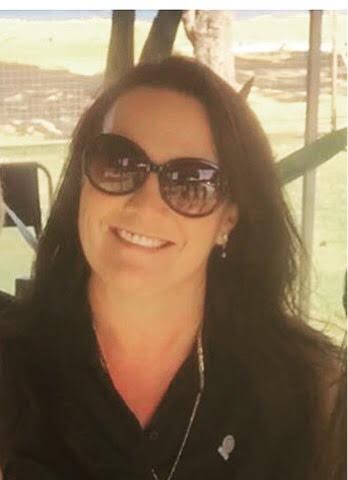 I’m socialising again and I’ve even started nursing again. I even want to eat healthy now. I no longer have cravings for chocolate or feel hungry all the time. I’ve also joined a company called Inner Origin which is an online shopping platform so I eat right and help others eat right too.
I’m socialising again and I’ve even started nursing again. I even want to eat healthy now. I no longer have cravings for chocolate or feel hungry all the time. I’ve also joined a company called Inner Origin which is an online shopping platform so I eat right and help others eat right too.
The skies the limit for me now. I follow a quote I saw one day that said, “Don’t try to be perfect, just try to be better than you were yesterday.”
Thank you for reading and I hope I can inspire or help others going through the same battles I did.
-Sheree
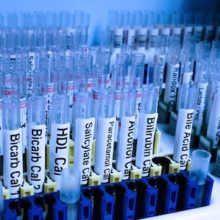
One of the frustrating experiences with depression is when doctors put you on a bunch of different medications.
It almost feels like you are a science experiment.
It’s hard to deal with all the changes, side effects, and feelings when they don’t work or make things more complicated.
Nancy emailed me sharing her story of how she was on many different medications and now she has successfully weaned off of them. She feels appropriate emotions and is doing much better.
Depression runs in my family on my mother’s side, although my gram, my mother, and my aunts never called it that. They tied it to being Irish, and called it melancholy.
I noticed as a child that my mother napped a lot. My siblings and I took it as normal… and she was always up to make supper when our father came home. It wasn’t until I was in high school at a friend’s house that I noticed a profound difference in how her mother behaved. My mother was nothing like her. My mother was emotionally unavailable, or extremely irritable. It was a rare occasion when she was happy.
When I was 7, my family went through a fire (12/31/1965 in Malden, Massachusetts), which killed my 3-year old cousin. My family and I were saved by a neighbor. This event changed me, forever. I had experienced death in a way no 7 year old child should ever have to. My mother told me years later that I was a different child after that. No more happy go lucky, and that there was a sadness in my eyes that was always there. In fact, my whole family was altered.. my gram, my aunts, and my parents. Being Irish, we were stoic and of course, time moved forward.
When I was 10, I was molested by an uncle. I didn’t tell my parents until he died when I was 19. Hitting puberty was when my psyche went through monthly ‘hits’ of depression, anxiety and sadness. By the time I was in high school, my self-esteem was very low. I was struggling emotionally, but I got good grades in school, was in the pep club, and had a few close friends.
At 15, I got a job at a day camp; it was after school during the school year, and full time in the summer. We had a sleepover at a conservation area with the kids, and after they went to sleep, the adult counselors had a fire with us junior counselors. They were passing around a bottle of apricot brandy, and I had never had a sip of alcohol.
When the bottle came to me, I was scared but didn’t want to seem ‘uncool’ and I took a sip. Almost immediately, there was a warmth that permeated my entire being… and I remember thinking that the pain was GONE. I felt relaxed, and happy… I had found relief from the anxiety and sadness that hung around me like an anchor.
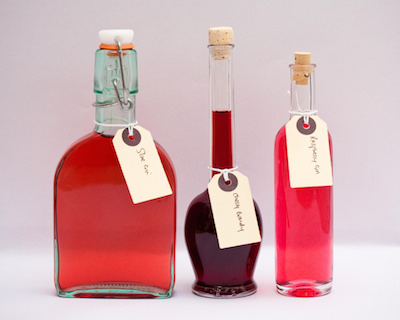
Many Times People Notice They’re Depressed When They Feel So Much Better After Drinking
Forward ahead a few years, and I got married, I had 3 children, and was still struggling. I went to counseling and my first antidepressant was prescribed – Zoloft. I only took it for 2 days because I felt like I was crawling out of my skin and I couldn’t sleep. Then Wellbutrin – Nope. I was then put on Prozac and Xanax, which I took for several years. It lifted my depression but stopped working after several years. I wasn’t depressed, but I felt flatlined emotionally.
I then changed medical prescribers and after a consultation, he thought I was bipolar so prescribed Paxil and Lithium. I was on these medicines for a few years. I was feeling like a science experiment, and becoming very discouraged.. During this period, details are a bit fuzzy, but I was switched to a new medical prescriber and after a time, she took me off lithium. I was still prescribed Xanax all through this time, only taking .25 mg to help me sleep, as needed. I was also prescribed Ativan to take daily for anxiety. I was also prescribed Ambien but only took it twice, not liking it at all.
While on the Paxil and Ativan, I began to rethink this whole medicine thing. I stopped the Ativan cold turkey. It was awful. I had to take Xanax to ease the withdrawal symptoms of muscle twitching… but I did succeed after about 3 weeks.
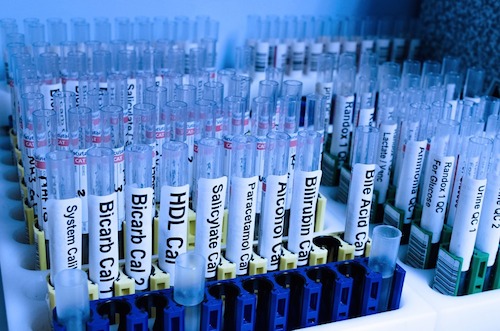
Being Prescribed Multiple Medications Can Feel Like You’re A Science Experiment
Again, I was given another prescriber (!) and when I explained the Paxil didn’t seem to be working, was prescribed Celexa. At first 10 mgs, then 20, then 40. I took 40 mgs for about 8 years. When I turned 58, I wanted to be untethered from anti-depressants entirely.
I assumed that, since I no longer had monthly hormonal swings, I would have less anxiety. Also, I wanted my brain back: good, bad, and indifferent. I started researching and reading how best to accomplish this. I learned that for older adults, Celexa is not good and can even be dangerous. My mind was made up, and I was determined.
I started weaning off Celexa on December 6, 2016. I started taking 20 mgs (down from 40), and did this for 7 days. I halved the dose again to 10 mgs for 7 days, then 10 mgs every other day for 7 days, then 10 mgs every 3rd day for 4 days, then none. By January 1, 2017, I was off Celexa completely. I was anti-depressant free for the first time in 23 years.
During this time, I had always taken a multivitamin, and I made sure I took a good one,. I also took 4 grams of a high quality omega-3 fish oil (which I was already taking for arthritis – works great for pain and stiffness), 500 mg of turmeric, 4000 units of D3 (2000 twice a day), sub-lingual B complex, and 100 mg of 5-htp twice per day. I also began taking 5 mg of melatonin at night which helped me sleep.
I also continued my almost daily walk at lunch (2-3 miles), and ate vegetables and good proteins. I had no brain zaps at all. I was concerned I would with such a fast wean but I did not. One of the first benefits of being off Celexa was DREAMING… it was years since I had remembered dreaming, and now I have vivid dreams that I remember almost every night. I also noticed an improved sense of smell and appropriate emotions – happiness and sadness.
I still do have anxiety and I am still working on relieving that, but I continue to take the above supplements and I seem to be holding my own. After being on anti-depressants for so long, I have to figure out what is appropriate sadness sometimes.. I hope my story can help someone else.
Nancy C., Epsom, NH

Depression hits you and you start to look up solutions.
Oh, perfect, you find that you can fix depression with just a pill.
Take an SSRI once a day and you won’t have any more problems.
Then after a while, you’re worse off than you were. Uh oh, let’s look up natural methods.
Someone tells you to just take 5-htp and everything will be better. Perfect.
But then you feel groggy and off-center. Nothing seems to work.
What’s the deal? What’s going on here?
I get emails all the time from people that are both using prescription drugs and from people that are trying to use amino acids and are frustrated that they are only partially working.
It’ll usually be something like this, “I was told I have a serotonin deficiency and I took Zoloft. It didn’t work, so I must be doomed forever.”
Or this, “I took 5-htp and it didn’t work. I was told that it was the cure to depression. What’s wrong?”
The problem is we are all confused as to where the depression is actually coming from in the first place.
We are focusing on the secondary symptoms of what is going on versus figuring out what is causing those symptoms. We’re trying to get of the symptom instead of what causes depression to appear in the first place.
For example, I was depressed for 11 years. I went to the doctors and they told me I had a disease and would need to take antidepressants for the rest of my life.
I took a bunch of different medications, with Celexa being the highlight, and they didn’t work or if they did, they only worked for a short period of time.
Then I read a bunch of books and started trying new things. I got off the antidepressants using b vitamins, tryptophan and 5-htp, and then I fixed my diet, corrected my vitamin d and magnesium deficiency, and then just like that, the depression was gone.
The doctors saw the “depression” as a “thing” versus a symptom. Instead of focusing on what causes depression they were focused on the symptoms I was experiencing.
I was suicidal, full of anxiety, low energy, and had a horrible mood. Why?
I had low levels of neurotransmitters in my brain. Why?
I was deficient in nutrients, minerals, and the building blocks for my brain to produce those neurotransmitters in my body to function. I was also worn down. Why?
I had gone through years of stress and trauma, ate horrible food, was having allergic responses to bread, and I was deficient in nutrients.
The solution? Fix my diet by eliminating gluten and limit dairy, eat lots of vegetables and healthy fats/proteins, take vitamin d and magnesium to get my levels into the optimal range, get my serotonin back by supplementing with amino acids, then simply eat healthy, sleep great, exercise, and get tests done every now and then to maintain that state.
The depression was just a symptom of all those factors which were messing up my body.
In reality, the depression is what led me to fix the issue. If I didn’t experience depression, I may not have noticed there was a problem to begin with.
If you want to fix depression, instead of focusing on putting a bandaid on your symptoms, find out what causes your depression instead to fix it at a deeper level.

Focus On The Deeper Root Causes
Some people might read my story and think, “Oh okay, what causes depression is gluten, lack of vegetables, and a vitamin d and magnesium deficiency. Perfect I’ll go do that.”
That may or may not work, because every person has different things causing their depression. Depression is unique for each person.
It’s also a very common thinking error that when something works for one person, they think it should work for everyone.
For example, one person finds that eating lots of carbs makes her feel better and then proclaims the ultimate diet is to eat bananas and potatoes all day. Yet, another person genetically doesn’t tolerate carbs very well, and actually he performs better with lots of healthy fats.
The answer isn’t to eat bananas all day, but to test if eating bananas and lots of carbs makes you feel good (or just get your DNA tested).
This commenter already knew that there was no deficiency in magnesium, but took it anyways because someone probably said it was the answer to everything.

No wonder it caused negative effects for him, he wasn’t supposed to be taking it in the first place.
One person might say that smoking marijuana fixed everything for him.
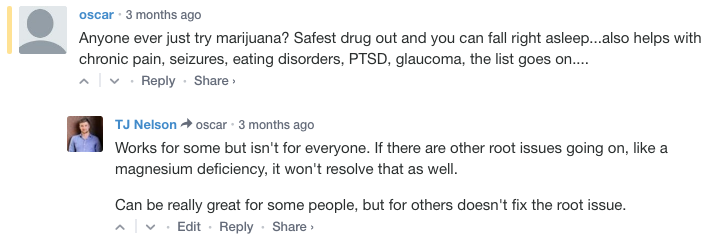
However, if I was to go smoke marijuana myself I would fall down a rabbit hole of despair within 3 days and get wrecked.
Some people get frustrated when some supplements work and some don’t work.

However, this person is actually on the right track! All the supplements that he took that didn’t work aren’t related to his root causes. That gives us clues to what he does and doesn’t need. If methyl b12 and magnesium is working, why is that making him feel better and what does that mean to get to the next level of healing?
You should always be asking yourself what causes depression for you.
If you try something and it doesn’t work, that is a good thing. That means you ruled that out and are one step closer to success.
Everyone has different causes for their depression. One person might have mineral deficiencies. One person might have heavy metal toxicity. One person might be allergic to gluten and eating so crappy for decades that their body can’t function anymore until some kale and spinach gets put in that belly. Another person might have a chronic Epstein-Barr virus infection, adrenal fatigue, leaky gut, and stress problems.
Each one of those people are going to have very different methods that work for getting better.
Hell, one person might just be a bit low and start taking cold showers or doing cryotherapy to feel better.

Why are we so focused on symptoms, band-aid solutions, proclaiming a one size fit-all approach, and little tricks instead of focusing on the truth about what causes depression?
Let me ask you a question.
What do you think would get more people to opt-in to a program?
If I said, “This One Little Supplement Cured 98.4% of All Depressed People That Took It!” or if I said, “Figure Out Your Depression’s Root Causes with Testing, Get On a Plan To Fix Them, and Beat Your Depression Long-Term by Changing Your Diet, Lifestyle, and Sleep.”
Exactly, the first one.
Is it easier to try to learn a trick or actually do the work? I
Is it easier to be sold “just take this pill” or is it easier to be sold, “Learn what causes depression for you, stop eating junk food and drinking coke, eat a lot of vegetables, get 8-9 hours of sleep, get a bunch of testing done to rule out deficiencies?”

“I’ll See You In Four Hours”
Easy and quick solutions sell a lot because our brains are hardwired to be lazy and do the least amount possible to get a desired result. You wouldn’t want to walk to your friend’s house in 4 1/2 hours when you could drive there in 28 minutes would you?
That’s why when we hear of a pill that can cure everyone, we want to take it. Our brain thinks, “Oh wow, that’s easy and won’t use too much energy so I can use that energy elsewhere for survival instead.”
Along with the myth that depression is simply a chemical imbalance and the push for antidepressants everywhere, people are confused as to what depression really is and how to actually fix it.
People usually only find my site after they take antidepressants for a while and realize they are still having a hard time.
It’s simple. If someone needs vitamin d and to fix their adrenal glands, anything other than correcting their vitamin d deficiency and getting their cortisol secretion on track will fix their depression.
It’s just harder to figure out what causes depression for you and implement the solution than it is to feel a symptom and get something quick that will just help the symptom.
Let’s say your house is filling up full of smoke because of a fire in the living room. This is causing you to choke and cough.
Taking a quick pill or looking for the quick solution is like focusing on the smoke and opening the windows so that you aren’t coughing anymore.
Focusing on what causes depression and fixing the root causes is like hitting the fire with a fire extinguisher so that there is no smoke production to begin with.
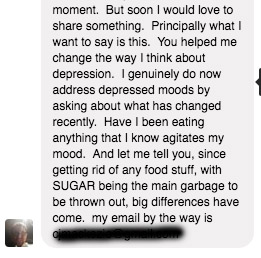 You must be focused on what causes depression for you and know that you have to figure that out to have depression relief long-term.
You must be focused on what causes depression for you and know that you have to figure that out to have depression relief long-term.
You must focus on your own personal physiology and figure out what works best for you instead of assuming one solution is the answer for everyone.
Once you adopt this mentality, everything will change for you and you’ll start to see depression for what it really is.
If I start to feel bad, instead of thinking, “Oh no! Depression has gotten a hold of me!” I instead think, “Hmm… what is happening that is making me feel that way?” Figure out what that is, and then fix it.
Let me know in the comments what you’ve done to figure out what causes depression for you and if you have any questions.

Chris looked like he “had it all” on the outside.
He had a job, a college degree, and lots of friends.
Yet on the inside he felt like a ticking time bomb full of depression and anxiety.
When it comes to depression, it doesn’t matter what’s on the outside when things are broken on the inside.
His depression started with alcohol but he had to do more than just quit alcohol to get back to normal.
Enter Chris:
As a college student, I started binge drinking at parties. I made a lot of good friends and managed to hold my grades together. But at some point between my junior and senior years, a dark cloud gradually drifted over my life. As it got worse, I drank more to cope with it.

There seemed to be no reason for my emotional deterioration. I’d had a happy childhood, with no trauma or family issues, and my life path was going according to plan.
This sudden dark cloud was a mystery to me. I’d always felt upbeat and optimistic, but I started to dread simple things like going to the store. I stopped working out regularly and started gaining weight. My college roommates later told me that they thought my behavior was strange. I sometimes slept for entire days. They considered sitting me down to talk about their concerns, but they were worried about how I might react.
Even when I graduated and went to work for a great company, I had an overwhelming sense that life was bland and uninteresting. I felt temporarily relieved of this state of mind when I drank. I realized that I was severely depressed, and that I had been using alcohol for years as an antidepressant. How could I be depressed when there was nothing obviously wrong with my life? This question haunted me throughout my early twenties.
I had heard that alcohol was a depressant. Perhaps this was the root of my problem, and all I needed to do was quit drinking alcohol. I reasoned that if I stopped drinking, I would start to feel better.
And so every few months, I fought through withdrawals and used willpower to take a few weeks off of drinking. I made plans with friends and announced beforehand that I would not be drinking with them. They respected my abstinence periods, and came to expect them.
But because I was still depressed, I was not fun to be around. I felt mildly paranoid in public places and had to plaster a smile on my face. During nights out in which everyone seemed to have fun except for me, I would go home early and go to bed feeling defeated. Inevitably, I would start drinking again.
I reached a dead end by the age of 27. On the outside, I had a college degree, a job, and friends. On the inside, I was a ticking time bomb of depression, anxiety, and alcohol addiction. I saw a therapist, who told me that I had a physical addiction to alcohol and that this was responsible for all of my emotional pain. If this was true, then why didn’t I feel better several weeks after giving up alcohol?
Like many alcoholics, I did not quit drinking until I hit a physical rock bottom. I got to the point where I could no longer handle my dark thoughts. I was borderline suicidal and experiencing withdrawals like never before.
I asked my friends and family for support, and detoxed off of alcohol with the help of benzodiazepines and group support meetings.
When I left the facility, I began hitting heavy weights every day with a fury. Exercise made me feel alive by giving me endorphin rushes. Group meetings helped me realize that I was not alone, but the sad stories also made me feel more depressed. I stopped going to meetings and the gym became my cathedral to personal transformation.

Getting physically fit kept me away from alcohol by giving me a reliable natural high with no negative side effects. But even a year after I quit drinking, something was still missing. I often felt emotionally vacant when I wasn’t working out. I wondered, are alcohol, workouts and drugs the only real sources of pleasure in life?
There had to be more to life than alternating between feeling just okay and kind of sad. During dinners and holidays, I could tell that my friends and family thought that I was glum and boring. I lacked lighthearted energy; I rarely joked around like I used to. They didn’t want to say anything because they were afraid that I would start drinking again.
I began reading everything I could about mental health disorders. I slowly started grasping the truth of the matter, which I can now articulate a lot more clearly. Alcohol had caused my depression, but simply quitting drinking wouldn’t resolve my depression once and for all. What my years of drinking had really done was damage my system and deplete my body of nutrients and neurotransmitters. Until I reversed the damage I had inflicted on my body and brain, it would be impossible for me to feel normal again.

When Chris Felt Better He Started Randomly Joking Around With Cashiers
I cleaned up my diet and started taking omega-3 oil, magnesium and vitamin D. My results astounded me, because I expected nothing. I started feeling calmer and even happier within the first week of taking these supplements.
People noticed that my mood had brightened up a bit. I stopped being so uptight and slowly developed a brighter sense of life. I started randomly joking around with cashiers at the grocery store and holding doors for people.
I did more research to figure out if there were other supplements that might help me. I read books by Joan Mathews Larson and other authors who saw mental health problems as primarily biochemical disorders.
I bookmarked Dominate Depression, which further convinced me that nutrition was a missing piece of my mental health puzzle. I started taking amino acids such as L-Tyrosine, DLPA, and 5HTP. Amino acid therapy, as it’s called, almost immediately helped me to take more pleasure in everyday life and put an end to my insomnia.
TJ’s informative and uplifting blog also helped me see that many people suffer from mental health disorders that can be treated with nutrition. Without discovering the nutritional cornerstones of mental health, I wouldn’t be where I am today.
It’s been nearly three years since I had a drink. Because I have repaired my physiology, I have no desire to drink at all. It’s hard to explain this to people, because many of them will assume that you are a natural-holistic-organic nutcase. But my transformation speaks for itself.
Getting back in control of my mental health had little to do with willpower or positive thinking. I’ve found that these things come naturally when I give my body everything it needs to feel good in the first place.
These days, I feel good most of the time and fantastic after a hard workout. I feel high on life, better than I ever did during my drinking days, when I hang out with good friends. During a recent trip to Chicago for New Years’ Eve, I neither craved alcohol nor felt depressed. I was afraid that the boozy nature of the event would be a trigger for my old dark thoughts. But I finally proved to myself that a certain level of mental health is all anyone really needs to become the life of the party.
I’ve kept all of the supplements that helped me repair my brain. Now I only take them on occasion. Herbs like ashwagandha and lemon balm are very helpful in those rare instances when my energy levels are off, or when something specific is bothering me and I need help taking off the edge. My nutrient reloading was an important phase, not a permanent regime of pills. I’m grateful that I never got hooked on prescription medications.
I woke up today on a cold and cloudy January morning. I felt happy and well rested. Three years ago, I would have felt pangs of dread. I would have blamed my condition on the weather, and then poured myself a drink to numb myself through the morning.
I could have ended the vicious cycle much sooner if I’d known then what I know now. Giving my system the building blocks it needs to function normally was one of the best things I’ve ever done for myself.
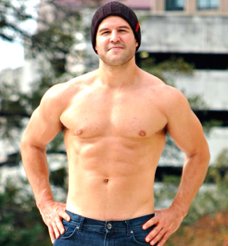 Chris Scott writes about addiction and fitness on his blog, Fit Recovery. After working in finance for five years, he became a personal trainer and enjoys helping people devise lifestyle strategies to align their mental and physical health.
Chris Scott writes about addiction and fitness on his blog, Fit Recovery. After working in finance for five years, he became a personal trainer and enjoys helping people devise lifestyle strategies to align their mental and physical health.